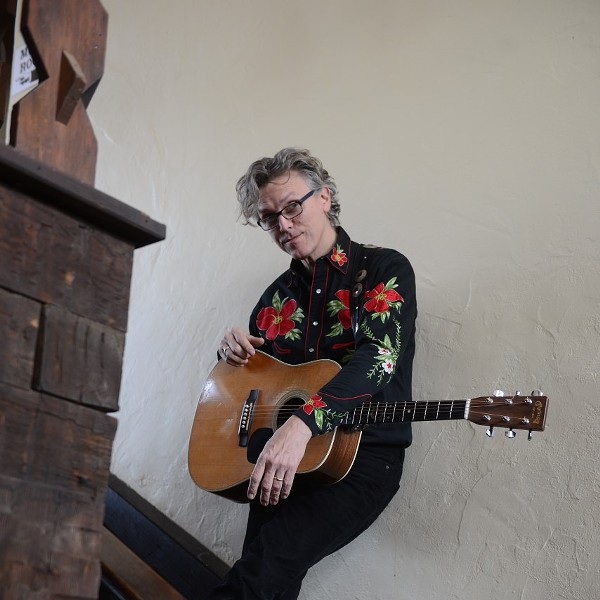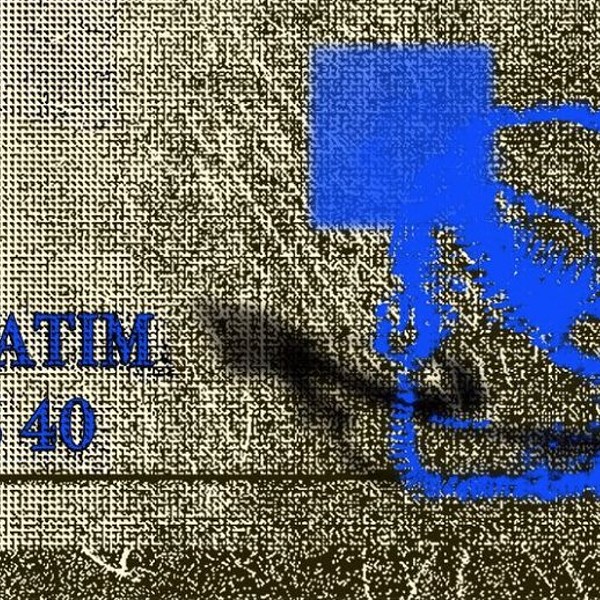Owen King keeps his coat on. It's a raw, sleety morning, and without the usual student crowd to warm up the room, New Paltz's cavernous CaféTeria is feeling the chill.
Dark-browed and affable, King clutches his coffee cup as if he were inside an ice-fishing shack. "I lost a lot of weight recently and I'm not used to it. I'm cold all the time," he explains. At one point he warms his hands by wrapping them inside his well-worn Red Sox beanie.
The kicker? King grew up in Bangor, Maine, not known for its tropical winters.
If you connected his hometown to some other writer named King, you would be right: He's the youngest of the literary dynasty that includes Stephen King, Tabitha King, and Joe Hill (born Joseph Hillstrom King); sister Naomi, a Unitarian minister, is the lone civilian.
This isn't something King waves in your face—his author bio doesn't mention his family, and the acknowledgments in his debut novel Double Feature (Scribner, 2013) and acclaimed story collection We're All in This Together (Bloomsbury, 2005) thank "my mom and my dad, my sister and my brother" without naming names. But he's media-savvy enough to know that questions will be asked, and fields them with well-practiced courtesy.
Though literary critics have already embraced King's stories, Double Feature should dispatch any lingering snark about coat-tailing family fame. King's name may have opened some doors, but the talent he brings to the room is all his. An exuberant love letter to the movies, with insights on failure, success, and family ties, his first novel is smart, ambitious, and funny as hell. There are quotable lines on every page: "Disappointment was the real common cold." Or: "The two black and white cats who lived with him cycled quietly in and out of the McMansion's rooms like maitre d's, checking to make sure the service was adequate." Whoever's son he may be, Owen King is that rarest of beasts: an original.
Still, a Freudian would have a field day with a story that pits a filmmaker son with auteur aspirations against a larger-than-life father who's made his name in the genre aisle of the video store. Sam Dolan is a college film major directing Who We Are, a Dogme-style microbudget feature that cleverly collapses four years of undergrad life into a single fateful day.
Everyone praises the script but Sam's father, who finds it "portentous." Booth Dolan is a larger-than-life hack actor with a mellifluous voice (think Orson Welles, selling no wine before its time) and a stellar wardrobe of prosthetic noses. Described as "the B-movie mainstay famous for his stentorian blink-free performances in such films as New Roman Empire, Hellhole, Hard Mommies, Hellhole 2: Wake the Devil, Black Soul Riders, and Hellhole 3: Endless Hell," Sam's father remains inescapable: "To this day, on the highest movie channels, the ones that are all gore and tits and robots, a black-haired Booth can still be seen battling evil with a plunger."
Stacked deck? Not quite. Sam's precious art film goes spectacularly amok, reaching a lower ring of cinema hell than Booth's toga and giant-rat epics—a disaster so epic it earns a cult following, complete with fansites, bellowed catch-phrases, and drinking games in Brooklyn hipster bars.
Sam's self-esteem tanks. He abandons directing for a heinous gig as a wedding videographer, and his private life devolves into occasional phone sex. Meanwhile, Booth emerges from his buffoonish fog, demonstrating an unimpeachable work ethic (a colleague dubs him "the Olivier of answering-machine messages") and an unexpectedly generous heart. Maybe you can go home again.
King is quick to squash autobiographical assumptions. "My dad isn't like Booth—no one who knew him would think that," he asserts. "Their voices are completely different. And my mother is nothing like Allie." Nor is Sam an authorial stand-in, though King concedes that "we share some opinions," including a passion for Dog Day Afternoon and a beef with E.T. "I saw it as a kid and was devastated," King says. "I wept in the theater, was deeply humiliated at having wept in the theater—I was probably seven—how exposed it made me feel."
King's never directed a movie, though acting in Vassar student films helped him recreate the rhythms of an underbudgeted set. The rest was research and invention. He worked on the novel for more than five years.
For locals, a few Hudson Valley locations may resonate. Russell College (named for King's former professor, novelist Paul Russell) shares some DNA with Vassar: "At Russell, there had been three or four gloomy, bilious girls who huddled in the Shakespeare garden in their hairy black pea coats, ostentatiously taking turns reading aloud from The Norton Anthology of Poetry." There are scenes at the Hyde Park Drive-In and Kingston multiplex. And Sam's hometown, with its funky cafés and Huguenot graveyard, is a body double for New Paltz, where King and his wife, novelist Kelly Braffet (Josie and Jack, Last Seen Leaving, and the forthcoming Save Yourself), have lived for five years.
The couple met in Columbia's MFA program, and soon shared a series of Brooklyn apartments, including a decommissioned church. "We met people in the neighborhood who were married or baptized there," says King. "It was kind of sad for them, knowing people were living in the altar."
Brooklyn was great, but the young couple wanted more space. "Kelly's from western Pennsylvania, north of Pittsburgh, and I'm from Maine. Neither of us are city people," says King. "New Paltz is just a good place to live. God, we've got two record stores! There probably aren't two record stores in New York City now."
An avid music fan, he's contributed lyrics to songs by The Paranoid Style, a band fronted by friends Tim Bracy and Beth Nelson. They're releasing a CD with a "Special Features and Deleted Scenes" chapbook for Double Feature. (Don't let the packaging fool you; the "deleted "scenes were written to order.)
There were bona fide deletions as well—King praises Brant Rumble, his editor at Scribner. ("My first book was with Bloomsbury and I did an anthology with Free Press, so nobody can take me more than once," he quips.) But the book's complex structure—key sections set in 2002-03 and 2011, with flashbacks to 1969, 1991, and 2000—has been in his head from the start.
"I wanted to write the kind of book that made me want to be a writer," he explains. "This word gets tossed around a lot, but a Dickensian kind of novel with a big cast, a lot of narrative movement and crossing paths. Like The Cider House Rules."
"My first book was really political—it's about unions and the 2000 election," King says, citing the left-leaning novella that gives We're All in This Together its title. It's followed by four shorter stories on such offbeat topics as back-country dentistry ("Frozen Animals," winner of the John Gardner Memorial Prize) and 1930s Coney Island baseball; the Denver Post called the collection "stupendous."
Double Feature is "not specifically political, but does have a lot to do with being famous for things you don't choose to be famous for." King searches for words. "Some of the intense cruelties of our time, the way the internet can expose you in ways you don't want to be exposed." He cites viral videos like "Star Wars Kid" and wincingly awful cult films like The Room as parallels to the "upside-down fame" Sam has thrust upon him. "What does that say about our society, and what does it mean to live with that?" he asks. "What's the second act of a weird American life these days?"
Double Feature also celebrates the vintage movies King loved as a kid. "The silliness of the B movies of the '80s was seminal to me. I have a great affection for those movies—they had a real sense of humanity. Horror films now are much grimmer and darker." He adds, "I should make it clear that I enjoy lots of horror movies and horror novels, and the ones by my father and brother are at the top of the list!"
Despite his respect for the family business, writing wasn't King's first career choice. Throughout his childhood and teen years, he dreamed of being a baseball pro. He played first base, pitched, and did time in the infield, becoming a statewide Little League champ, and later, Maine high school state champion. When a career in the major leagues didn't materialize, he turned to literature.
Coming full circle, he's now researching a baseball-themed novel. When he finishes a draft, Braffet will be his first reader. Next comes his family. "Everyone reads everyone else's work," he says, wrapping his coat a bit tighter around himself.
Owen King takes a deep breath. "I have a sense of what people would like to hear—that the novel's very autobiographical, a lot of dirt, that I write horror novels—but it's just not the truth. I'm very close to my family, very grateful to my parents and admiring of their work." He shrugs. "The answers are kind of bland because the truth is kind of bland."
Thank god for fiction. Or, in the reverberant words of Booth Dolan, "So. Make believe. It is important. Your second feature will start soon."
Owen King will appear 4/5 at 7pm, Inquiring Minds, New Paltz; 4/14 at 11am, Read Local Red Hook, on a panel with Kelly Braffet and others; 4/27 at 7pm, Oblong Books & Music, Rhinebeck.


















